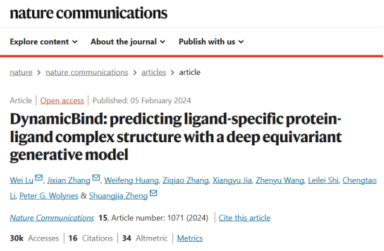Please click the button below to go to our email login page
|
A young PI from Shanghai Jiaotong University sets the tone for AI-driven pharmaceuticals due to a researchNo one ever thought that on the occasion of the researcher AlphaFold winning “the Nobel Prize for Chemistry”, a young PI, Shuangjia Zheng, from Shanghai Jiaotong University led the team to develop DynamicBind, which can predict dynamic complex structure on the basis of AlphaFold static structure prediction, also representing the future development direction of AI-driven pharmaceuticals.
This method has been published on Nature Communications, and has been verified experimentally on International Drug Screening Competition CACHE to be able to screen competitive potential compounds for targets that hardly develop into drug for Parkinson's disease.
Grope for unveiling more scientific possibilities
Actually, in the early stage of AI-driven pharmaceuticals development, Shuangjia Zheng began to conduct relevant research. His team focused on pre-clinical drug development. They used AI technology to screen high-quality initiating molecules from chemical space and conducted multiple rounds of optimization, to significantly improve efficiency.
DynamicBind is one of his proudest achievements, the core function of which lies in predicting the interactions between small molecules and proteins. Its application value in the pharmaceutical field far exceeds that of AlphaFold, which is only capable of predicting the structures of protein monomers.
In the process of drug development, researchers may notice the presence of multiple pockets in one protein structure, among which several pockets can only open under some specific circumstances.
When predicting structures through AlphaFold, it often fails to capture what is known as “cryptic pockets”. However, the team introduced the Dynamic module, and thus DynamicBind can effectively capture how these cryptic pockets emerge and how they bind with small molecules.
Stood at “an era full of opportunities” by sheer coincidence
In 2017, 22-year-old Shuangjia Zheng entered the School of Pharmaceuticals at Sun Yat-sen University to pursue a master’s degree, studying under Professor Jun Xu, who is one of the pioneers in computational chemistry and chemoinformatics in China.
At the end of 2018, Shuangjia Zheng published his first paper during his master’s program in the top journal of chemoinformatics. This work was one of the earliest in China to use generative AI for molecular generation.
Reflecting on his doctoral experience, Shuangjia Zheng is very grateful to his doctoral supervisor, Professor Yuedong Yang from the School of Computer Science at Sun Yat-sen University, an outstanding computational biologist who provided him with extensive interdisciplinary training.
In 2019, by sheer coincidence, Shuangjia Zheng met an important entrepreneurial partner in his life—Chengtao Li, who had graduated from Tsinghua University as an undergraduate and had just returned to China after completing his Ph.D. in Computer Science at MIT. Shuangjia Zheng quickly joined the newly established Xingyao Technology as a founding member.
Accumulating a group of people with ideas, and no Push required
In early 2023, Shuangjia Zheng received postdoctoral offers from top universities such as Harvard and MIT, as well as an offer for a tenure-track assistant professor position at Shanghai Jiaotong University. Ultimately, he chose to pursue an academic career in China.
“I wish to find more possibilities for the future of AI-driven pharmaceuticals through fundamental technological innovation, rather than simply focusing on current hot topics”, he said.
When constructing lab, this young PI had his own approach. He believes that a meaningful direction is of great significance for accumulating a group of creative individuals, which can promote them to naturally take initiative and create a positive atmosphere without the need of push.
Shuangjia Zheng encourages his peers to pursue what they are most passionate about and not to force themselves into fields that do not suit them. In his view, wind (opportunity) is not only a matter of luck but also the result of preparation. “Waiting for the wind” implies that he has already prepared himself for takeoff when the wind (opportunity) arises. |

